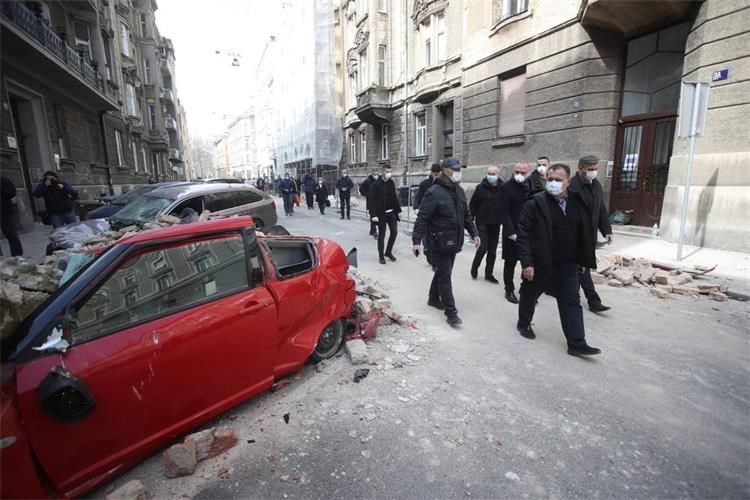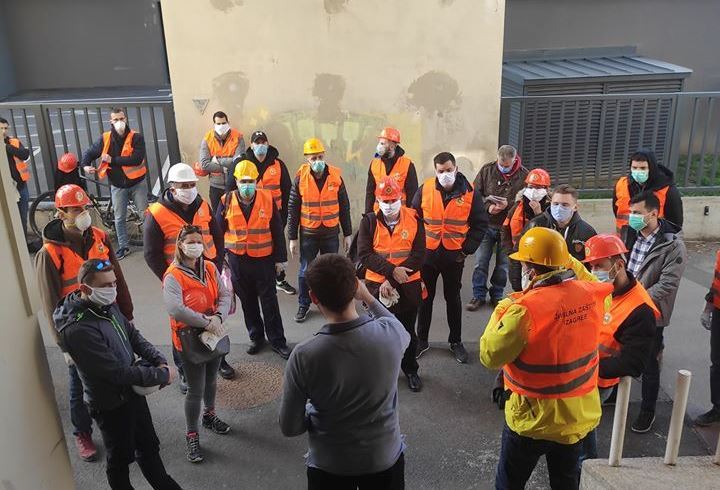Thessaloniki gets ready for its metro launch in November
The underground rapid transit lines have been under construction for almost two decades due to various project delays
 TheMayor.EU logo
TheMayor.EU logo Croatia's capital is remedying damages from the earthquake while fighting against coronavirus
Early in the morning this Sunday, Zagreb was hit by the strongest earthquake for the last 140 years. Numerous homes, buildings and hospitals were damaged. Citizens of the Croatian capital felt 3 strong earthquakes in a row.
The strongest of them was 5.5 Richter. A 15-year-old girl died of her injuries despite doctors fighting for her life for two days. 17 people are seriously injured but in a stable condition.
The City of Zagreb has introduced two toll-free hotlines, 0800 8805 and 0800 8802, to help anyone who is left without their home or whose house is severely damaged after the earthquake.
On Sunday afternoon local authorities provided a warm lunch to the people left outside, food was handed out at 4 different locations in the city. For all those whose homes have been damaged, accommodation is provided in the student dormitory Cvjetno naselje. So far, 176 citizens are housed there.
Damage is most significant in the city centre, where most of the buildings are old. So far, citizens have reported more than 700 facilities for which structural engineers need to assess whether they are still suitable for residence and use.
Among the severely affected public buildings are the Zagreb Cathedral from which part of the southern tower fell, the Croatian Parliament, theatre Komedija and the Museum of Arts and Crafts. 63 facilities of institutions in the science and education system are also damaged.
 Croatian prime minister Andrej Plenković, ministers and President Zoran Milanović visited the sights hit the hardest. Photo by Government of Croatia
Croatian prime minister Andrej Plenković, ministers and President Zoran Milanović visited the sights hit the hardest. Photo by Government of Croatia
Despite the strong earthquake, state and local authorities warn that the coronavirus remains the greater danger and urge citizens to comply with all measures aiming to prevent its spread. The emergency made this impossible in the first moments after the earthquake.
In order to protect themselves from potential new earthquakes, many people took to the streets immediately after the first, but at the time of panic, not everyone followed the instructions for social distancing. Although the authorities banned gathering of more than five people, police officers, soldiers, firefighters and doctors had to go out in the streets to help the citizens of Zagreb.
The City of Zagreb called on all structural engineers from the field of masonry and concrete construction to engage in the process of assessing the condition of buildings and houses.
Local authorities ask experts to bring their own protective gear with them - masks, gloves and helmets. If they don`t have such, the Emergency Management Office has indicated that it will provide the necessary equipment. Currently, there are around 300 structural engineers in the streets visiting the affected buildings and houses.
 Emergency workers are in the streets despite the threat of coronavirus. Photo by City of Zagreb
Emergency workers are in the streets despite the threat of coronavirus. Photo by City of Zagreb
Following a telephone session, the Croatian government decided on Tuesday to open a bank account for financial help in the "Together for Zagreb" campaign. Immediately after, the City of Zagreb activated the special purpose account dedicated to remedying the damage of the earthquake. Anyone can donate funds to the account:
IBAN HR5723600001502749340
SWIFT ZABAHR2X

The underground rapid transit lines have been under construction for almost two decades due to various project delays

Now you can get your wine in Talence by paying directly in Bitcoin

That’s because the state has to spend money on updating the railway infrastructure rather than subsidizing the cost of the popular pass

Rethinking renewable energy sources for the urban landscape

The examples, compiled by Beyond Fossil Fuels, can inform and inspire communities and entrepreneurs that still feel trepidation at the prospect of energy transition

Now you can get your wine in Talence by paying directly in Bitcoin

The 10th European Conference on Sustainable Cities and Towns (ESCT) sets the stage for stronger cooperation between the EU, national and local level to fast track Europe's transition to climate neutrality.

At least, that’s the promise made by the mayor of Paris, Anne Hidalgo

The underground rapid transit lines have been under construction for almost two decades due to various project delays

At least, that’s the promise made by the mayor of Paris, Anne Hidalgo

Hostal de Pinós is located in the geographical centre of the autonomous region

Despite its church-y name, the district has long been known as the hangout spot for the artsy crowds

Urban dwellers across the EU are having a say in making their surroundings friendlier to people and the environment.

Forests in the EU can help green the European construction industry and bolster a continent-wide push for architectural improvements.

Apply by 10 November and do your part for the transformation of European public spaces

An interview with the Mayor of a Polish city that seeks to reinvent itself

An interview with the newly elected ICLEI President and Mayor of Malmö

A conversation with the Mayor of Lisbon about the spirit and dimensions of innovation present in the Portuguese capital














